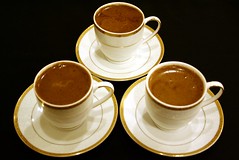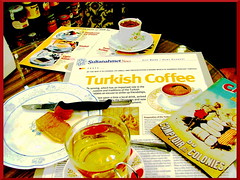Caffeine is a drug, yes, but a very sweet one at that. It enhances the senses and uplifts the spirits. Coffee is, without a doubt, a culture unto itself. Used as a means to gather, laugh and debate. Coffee is a social beverage. Its roots are as storied and full as the roasts you may drink.
Within the borders of Turkey coffee has become an institution. It has its own culture complete with ritual and house of worship (coffeehouses). Turkish coffee, in particular may, without a doubt in most coffee lovers' minds be the be all and end all of coffee. It was introduced to Turkey in the early to mid 1500's, finding the first coffeehouse opening soon after.Coffee came at a rather interesting time in Turkish history as it was geared more toward decadence than business. This gave way to many rituals. One of which was to brew the beans slowly over fifteen to twenty minutes in a copper coffee pot nestled among the embers of smoldering charcoal. The pot was removed frequently to prevent overheating. You can certainly tell the difference, if you are a coffee connoisseur, between Turkish coffee and your run of the mill modern day restaurant coffee.
The Turks believed in delicate brewing and all that was needed was a copper pot that came to a point, a teaspoon and something to heat it with. Water was always cold and the coffee fresh ground right before brewing. One thing that makes Turkish coffee so good, rich and special as that many would add cardamom and or sugar to the ground prior to brewing. Also unique is that the ingredients were added to the water instead of the water added to the ingredients. After all of the ingredients are added, they are stirred, spoon removed and pot placed on the heating source. No more stirring occurs and the pot is removed periodically to prevent the overheating mentioned earlier.Identifying well prepared Turkish coffee is easy. It's not too hot and has a thick foam resting comfortably on top and is free of any dark particles. In some circumstances, the coffee is brought to a boil and just before boiling over is removed the heat then replaced to do it all over again. This process is done two or three times and concentrates the coffee down. Cold water is served and drank before the coffee to cleanse the palette. Traditionally, the pastry known as Turkish Delight was served alongside the coffee and afterward you're treated to mint liqueur.
Turkish coffee is special. Not because it tastes good, but because of the care and love that is put into the preparation and consumption of it. Coffee has a very special meaning to the Turkish people and to the culture of their land and that should be respected. The whole premise and life of coffee in Turkey gave way to all of the coffeehouses and coffee business that we partake in to this day from our Starbucks and Dunkin Donuts to your mom and pop Beatnik Coffee Dens. Without Turkish coffee, we would have no coffee at all.Steve is a regular contributor to Coffee Maker Review an informational website for Coffee Maker ratings and reviews on the top brands including Bunn Coffee Makers and Senseo Coffee Makers
Article Source: http://EzineArticles.com/?expert=Stephen_Haworth
http://EzineArticles.com/?Whats-So-Special-About-Turkish-Coffee?&id=1026602
"A single cup of coffee can create a friendship that lasts for 40 years"
Turkish Coffee is the name given to a type of coffee whose preparation and brewing techniques were invented by the Turks. It has a unique taste, froth, aroma, brewing technique and presentation… in other words it has its own identity and tradition.
The first coffee was made in the Arabian Peninsula by boiling coffee cherries. The new method invented by the Turks revealed coffee's true flavour and peerless aroma. The Turks introduced coffee to Europe where for many years it was prepared and consumed as Turkish Coffee.
Turkish Coffee is made from high quality arabica coffee beans from Central America and Brazil that are blended and carefully roasted, then very finely ground. The coffee is mixed with water and the desired amount of sugar and cooked in a "cevze", or Turkish coffeepot. The coffee is served in small cups. The coffee must be left to stand for a short time after serving to allow the grounds to settle at the bottom of the cup.
Originally uploaded by EEY
It's an experience to do: sit in a historic turkish coffee, drink coffee and watch the people who comes and goes.
In 1864 Mr Hafiz Mustafa sold syrupy baklava, lokum (Turkish delight) and chocolates. Nothing much has changed in his Eminonu store; piles of pastries and jars of sweets still tempt locals and international visitors. There is a simple café upstairs.
Originally uploaded by Maria Rosaria Sannino/images and words











2 comments:
very nice post and nice blog, I enjoy reading it.
www.coffee-maker-review.net/senseo-coffee-maker.html
Beautiful post. I might use some info I've learnt on my site: Coffee Grinder Reviews.
Post a Comment